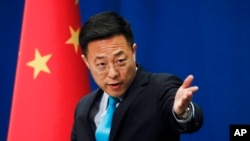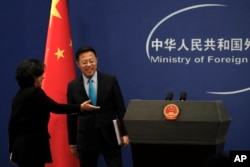Somewhat cryptically this week, China sidelined the combative Ministry of Foreign Affairs spokesperson Zhao Lijian to a new, lower-profile job “in accordance with needs.”
As part of a trio of official spokespeople at the ministry, Zhao carved a notorious reputation for his aggressive approach to Chinese diplomacy and scrupulous adherence to Communist Party propaganda lines. As Voice of America’s Natalie Liu described it:
“Zhao Lijian had been the model of a diplomatic ‘wolf warrior,’ castigating the nation’s critics at daily Foreign Ministry briefings while building an online audience of 1.9 million followers on Twitter and almost 7.7 million on Weibo, the Chinese counterpart.”
Along the way, Zhao regularly spread misinformation and disinformation from his official post. That made him a regular target of Polygraph.info fact checks.
In recognition of his departure, here are a few of Zhao’s most outrageous whoppers:
COVID Conspiracies
In December 2019, SARS-CoV-2, the novel virus which causes COVID-19, was first identified in the Chinese city of Wuhan. Questions persisted whether the virus was natural or manmade. Beijing opted to deflect blame by claiming the United States may be the actual source of the global pandemic.
On March 12, 2020, Zhao took to Twitter to claim the “U.S. army” may have “brought the epidemic to Wuhan.”
He provided no evidence for the claim, but China would run with the conspiracy theory anyway.
Four Super Fake Coronavirus Claims (That We Saw Today)
Here We Go Again: U.S. Military Did Not Bring COVID-19 To Wuhan
Phony Ukrainian Biolabs
Following its February 2022 invasion of Ukraine, Russian state media ramped up false claims that Russian troops had stumbled upon Ukrainian bioweapon labs run by the United States.
China, which has repeatedly carried water for Moscow’s war, was happy to repeat that claim.
On March 8, 2022, Zhao claimed the U.S. had “26 bio-labs and other related facilities in Ukraine,” adding "the biological military activities of the U.S. in Ukraine are merely the tip of the iceberg.”
The only problem: None of the biolabs in Ukraine are run or controlled by the U.S. What’s more, the anything-but-secret labs are conducting legitimate research, not “biological military activities.”
How China Spread Kremlin’s False Biolab Claims
Forced Falsehoods in Xinjiang
After the U.S. Senate passed the Uyghur Forced Labor Prevention Act, Zhao claimed accusations of forced labor in China’s northwestern Xinjiang Uyghur Autonomous Region were “a sheer lie.”
But victim testimonials, academic reports, media investigations and Chinese government and corporate sources paint another picture of the plight of the Uyghurs and other ethnic minorities.
And in August 2022, the U.N. High Commissioner for Human Rights reported crimes against humanity and violations of international law on China’s part.
Despite Growing Evidence, China Denies Uyghur ‘Forced Labor’
A Not So Free Press
On July 22, 2021, a BBC report on deadly flooding in Zhengzhou sparked anger among Chinese netizens, resulting in an angry confrontation between residents and a reporter from the German news outlet Deutsche Welle.
Commenting on the situation, Zhao said the “reporting environment for foreign correspondents in China is open and free.”
In fact, foreign correspondents say media freedom has “deteriorated significantly” in China, with harassment, intimidation, physical and online surveillance common. The advocacy group Reporters Without Borders (RSF) ranks China near the bottom of countries in press freedom.
Journalists must be licensed by the government, RSF reports, and show fealty to President Xi Jinping: “To receive and renew their press cards, journalists must download the ‘Study Xi, Strengthen the Country’ propaganda application that can collect their personal data.”
While Fanning Hostility, China Falsely Claims Foreign Journalists Have “Unfettered” Access
Trouble on High Seas
On August 28, 2022, Zhao called the transit of U.S. military vessels in the South China Sea a “provocation aimed at ‘freedom of trespassing’.”
But the record shows that it is Beijing that has repeatedly threatened its neighbors through sweeping claims of sovereignty over the sea, along with other aggressive actions.
China continues to ignore international court rulings while militarizing islands, sinking fishing vessels and intimidating its neighbors in their own back yard.
Beijing Bullies its South China Sea Neighbors, Then Falsely Accuses U.S. of ‘Trespassing’
Deception in Africa
On August 9, U.S. Secretary of State Antony Blinken arrived in the Democratic Republic of Congo as a part of a three-country visit to Africa.
Zhao commented on Washington’s presence in Africa with a meme contrasting a Chinese surveyor in Africa with a U.S. soldier.
The tweet read: “#China brings techniques to #Africa. The #US brings violence to Africa.”
Funny thing is, the 10-year-old picture used by Zhao showed a U.S. Marine training Ugandan troops for a regional peacekeeping mission that China itself had signed off on.
Though China may have brought “techniques” to Africa, it has also increased its military presence, selling arms and providing training while not always keeping an eye on where its weapons end up.
Beijing Lies About a Photo to Smear Blinken’s Outreach in Africa
Cyberattacks? What Cyberattacks?
On July 19, 2021, the U.S. and other Western powers called out China for cyberattacks involving Microsoft Exchange email server software and other ransomware breaches.
Zhao denied the allegations, claiming the U.S. and its allies had ganged up on China. Beijing “will never encourage, support or condone cyberattacks,” he proclaimed. But intelligence agencies and independent analysts have regularly linked the Chinese state to cyberattacks.
The U.S. cybersecurity firm CrowdStrike called China “one of the most prolific state-sponsored cyber actors on the planet.” Microsoft also has identified China as a prolific source of nation state hacking attacks.






